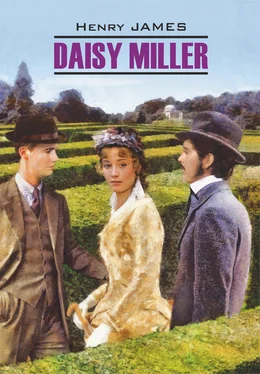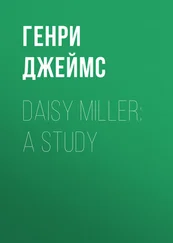“I should think it might be arranged,” said Winterbourne. “Couldn’t you get some one to stay – for the afternoon – with Randolph?”
Miss Miller looked at him a moment; and then, very placidly —
“I wish you would stay with him!” she said.
Winterbourne hesitated a moment. “I would much rather go to Chillon with you.”
“With me?” asked the young girl, with the same placidity.
She didn’t rise, blushing, as a young girl at Geneva would have done; and yet Winterbourne, conscious that he had been very bold, thought it possible she was offended. “With your mother,” he answered very respectfully.
But it seemed that both his audacity and his respect were lost upon Miss Daisy Miller. “I guess my mother won’t go, after all,” she said. “She don’t like to ride round in the afternoon. But did you really mean what you said just now; that you would like to go up there?”
“Most earnestly,” Winterbourne declared.
“Then we may arrange it. If mother will stay with Randolph, I guess Eugenio will.”
“Eugenio?” the young man inquired.
“Eugenio’s our courier. He doesn’t like to stay with Randolph; he’s the most fastidious man I ever saw. But he’s a splendid courier. I guess he’ll stay at home with Randolph if mother does, and then we can go to the castle.”
Winterbourne reflected for an instant as lucidly as possible – “we” could only mean Miss Daisy Miller and himself. This programme seemed almost too agreeable for credence; he felt as if he ought to kiss the young lady’s hand. Possibly he would have done so – and quite spoiled the project; but at this moment another person – presumably Eugenio – appeared. A tall, handsome man, with superb whiskers, wearing a velvet morning-coat and a brilliant watch-chain, approached Miss Miller, looking sharply at her companion. “Oh, Eugenio!” said Miss Miller, with the friendliest accent.
Eugenio had looked at Winterbourne from head to foot; he now bowed gravely to the young lady. “I have the honour to inform mademoiselle that luncheon is upon the table.”
Miss Miller slowly rose. “See here, Eugenio,” she said. “I’m going to that old castle, any way.”
“To the Château de Chillon, mademoiselle?” the courier inquired. “Mademoiselle has made arrangements?” he added, in a tone which struck Winterbourne as very impertinent.
Eugenio’s tone apparently threw, even to Miss Miller’s own apprehension, a slightly ironical light upon the young girl’s situation. She turned to Winterbourne, blushing a little – a very little. “You won’t back out? [6] You won’t back out? – ( разг. ) Вы ведь не передумаете?
” she said.
“I shall not be happy till we go!” he protested.
“And you are staying in this hotel?” she went on. “And you are really an American?”
The courier stood looking at Winterbourne, offensively. The young man, at least, thought his manner of looking an offence to Miss Miller; it conveyed an imputation that she “picked up” acquaintances. “I shall have the honour of presenting to you a person who will tell you all about me,” he said smiling, and referring to his aunt.
“Oh, well, we’ll go some day,” said Miss Miller. And she gave him a smile and turned away. She put up her parasol and walked back to the inn beside Eugenio. Winterbourne stood looking after her; and as she moved away, drawing her muslin furbelows over the gravel, said to himself that she had the tournure [7] tournure – ( фр. ) манеры
of a princess.
He had, however, engaged to do more than proved feasible, in promising to present his aunt, Mrs. Costello, to Miss Daisy Miller. As soon as the former lady had got better of her headache he waited upon her in her apartment; and, after the proper inquiries in regard to her health, he asked her if she had observed, in the hotel, an American family – a mamma, a daughter, and a little boy.
“And a courier?” said Mrs. Costello. “Oh, yes, I have observed them. Seen them – heard them – and kept out of their way.” Mrs. Costello was a widow with a fortune; a person of much distinction, who frequently intimated that, if she were not so dreadfully liable to sick-headaches, she would probably have left a deeper impress upon her time. She had a long pale face, a high nose, and a great deal of very striking white hair, which she wore in large puffs and rouleaux [8] rouleaux – ( фр. ) локоны
over the top of her head. She had two sons married in New York, and another who was now in Europe. This young man was amusing himself at Homburg, and, though he was on his travels, was rarely perceived to visit any particular city at the moment selected by his mother for her own appearance there. Her nephew, who had come up to Vevey expressly to see her, was therefore more attentive than those who, as she said, were nearer to her. He had imbibed at Geneva the idea that one must always be attentive to one’s aunt. Mrs. Costello had not seen him for many years, and she was greatly pleased with him, manifesting her approbation by initiating him into many of the secrets of that social sway which, as she gave him to understand, she exerted in the American capital. She admitted that she was very exclusive; but, if he were acquainted with New York, he would see that one had to be. And her picture of the minutely hierarchical constitution of the society of that city, which she presented to him in many different lights, was, to Winterbourne’s imagination, almost oppressively striking.
He immediately perceived, from her tone, that Miss Daisy Miller’s place in the social scale was low. “I am afraid you don’t approve of them,” he said.
“They are very common,” Mrs. Costello declared. “They are the sort of Americans that one does one’s duty by not – not accepting.”
“Ah, you don’t accept them?” said the young man.
“I can’t, my dear Frederick. I would if I could, but I can’t.”
“The young girl is very pretty,” said Winterbourne, in a moment.
“Of course she’s pretty. But she is very common.”
“I see what you mean, of course,” said Winterbourne, after another pause.
“She has that charming look that they all have,” his aunt resumed. “I can’t think where they pick it up; and she dresses in perfection – no, you don’t know how well she dresses. I can’t think where they get their taste.”
“But, my dear aunt, she is not, after all, a Comanche savage.”
“She is a young lady,” said Mrs. Costello, “who has an intimacy with her mamma’s courier.”
“An intimacy with the courier?” the young man demanded.
“Oh, the mother is just as bad! They treat the courier like a familiar friend – like a gentleman. I shouldn’t wonder if he dines with them. Very likely they have never seen a man with such good manners, such fine clothes, so like a gentleman. He probably corresponds to the young lady’s idea of a Count. He sits with them in the garden, in the evening. I think he smokes.”
Winterbourne listened with interest to these disclosures; they helped him to make up his mind about Miss Daisy. Evidently she was rather wild. “Well,” he said, “I am not a courier, and yet she was very charming to me.”
“You had better have said at first,” said Mrs. Costello, with dignity, “that you had made her acquaintance.”
“We simply met in the garden, and we talked a bit.”
“Tout bonnement! [9] Tout bonnement! – ( фр. ) Вот так попросту!
And pray what did you say?”
“I said I should take the liberty of introducing her to my admirable aunt.”
Читать дальше












